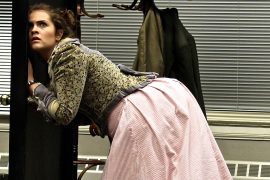On November 22rd, 2022, Tim Burton, the filmmaker behind Edward Scissorhands, Nightmare Before Christmas, and countless other dreary classics, debuted a new show on the massive streaming platform Netflix, entitled Wednesday, to great commercial success. An adaptation, or perhaps a reimagining, of the original The Addams Family television series from the 1960’s. It stars Jenna Ortega, of You and of Disney Channel fame, performing in the roll of the titular glowering, desaturated, (“she’s allergic to color”) and detached Wednesday Addams. In typical Tim Burton fashion, the show sits on the borderline between creepy and charming, with the over-the-top theatricality the public has come to expect from Burton’s productions.
The difficulty in adapting any pre-existing property is the same: stay true to the source material, or take it in a different direction? With Wednesday, the showrunners decided to narrow the focus. Where the original broadcast was a 64-episode sitcom, Netflix’s adaptation is an eight-part serial drama/mystery series. The original show (derived from a series of New Yorker cartoons from the ‘30’s by Charles Addams) and most of the more recent spin-offs focus on the entire Addams Family, where Wednesday–fittingly–focuses primarily on Ortega’s character. In the original sitcom, Wednesday’s role was played by Lisa Loring, was more of a side character who delivered off-putting one liners and generally looked macabre.
In a post-Harry Potter and young-adult-novel-craze world, however, the public perception of fantasy, and especially of ‘alternative’ protagonists, has changed. Audiences nowadays are simply harder to unnerve. This is perhaps why recent portrayals have primarily been animated, harmlessly silly, or targeted at kids; or all of the above. Tim Burton, therefore, is left with a significant challenge. How does one present this character in a fresh way?
A concern of Ortega’s and presumably of Burton’s, was to make this adaptation “different.” The Addams Family sitcom has been canonized in popular culture in the roughly six decades since its release. Halloween costumes, spin-offs, its somewhat cult status, its abhorrently catchy theme song–leverly referenced in Wednesday with her two finger snap to open the secret door–have all been done to death. However, it isn’t surprising for Burton to be drawn to the Addams Family as a property. It’s right down his alley; the perpetually-dim sets, the goth aesthetic, the slightly spooky nature of the entire concept. The tone, and according to Ortega, meticulous direction (“the first day of filming he spent ten minutes with a hairdresser’s comb…”) of Tim Burton’s style is ever-present in Wednesday, and serves the setting well.
Nevermore Academy, where Wednesday goes to school in the adaptation, is so Burtonesque it hurts: gargoyles, more spindly towers than could ever be reasonable, black wood-paneled rooms, a dormitory with a huge leaded-glass window formed to look like a spiderweb. The set designers had a field day.
What is noticeably absent from the show is a quality of nicheness. The appeal is designed to be as broad as possible. Where the original Addams Family was off-putting in a way that’s designed to startle the viewer, and portrayed the characters as perfectly content in their strange, creepy reality. Wednesday attempts to sway the audience with pathos. Wednesday herself is an outcast among ‘outcasts.’ She is given the powers of a seer in the show–which is helpful for the plot and her new identity as a detective–but the other kids in the school behave basically as if they were normal teenagers. The demographics include werewolves, vampires, and gorgons, but they are all reasonably sociable monsters with emotions and feelings and such. Wednesday, resolute to distance herself from any of her peers lest they interfere with her novel or her mystery-solving, is therefore an oddity. Despite this, she eventually opens up and makes some friends, gets involved in a bizarre, somewhat forced-love triangle; without this the character would be flat and wouldn’t have this degree of narrative dynamic. This is the main difficulty of the show; on a sitcom, characters are flat. They don’t change all that much from episode to episode, sometimes not at all for the whole length of the runtime. Serialized dramas require characters to make changes and to grow, but does Wednesday stay Wednesday if she does?
This change, giving Wednesday a heart, has proven divisive. Hardcore fans of the original series think the authenticity of the character has been tainted in some way, and people who belong to the niche group, who define themselves as ‘alt,’ ‘goth,” or “emo,” etc., think the mass appeal of the show is purloining their identity for profit. The cynics are saying, The Addams Family shouldn’t be for just anyone.
I disagree. Why not? The show is well-written (usually), well-acted (for the most part), and well-directed. Is it high art? Not quite. Is it intensely watchable? Yes. Was the original show a beacon of television perfection? Doubtful. Does Tim Burton have the time of his life and deliver a fun romp through a vaguely creepy world, as usual? I believe so.
As for whether it is worth watching, it depends. Are you a luddite of the original show and would be appalled if anything were to happen to your favorite intellectual property? Or are you someone looking to be entertained for about six hours? If the latter, yes, I think so. If the former, steer clear.





